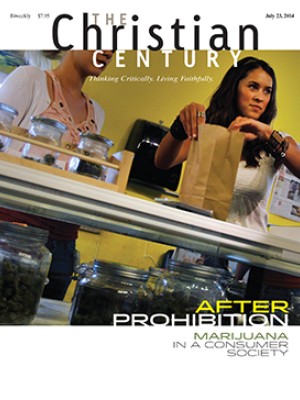PCUSA votes to divest funds, to marry gays where legal
The Presbyterian Church (U.S.A.) has decided to divest church funds from three American companies.
The 310-303 vote June 20 at the church’s General Assembly in Detroit marks a victory for divestment supporters both within and without the 1.8-million-member PCUSA, now the largest American church to embrace divestment as a strategy to pressure Israel to return its illegally held lands.
According to divestment supporters, these companies supply electronic and earth-moving equipment that helps Israel violate Palestinian rights. Presbyterians in support of the resolution described the divestment vote as a long- overdue stand on behalf of Palestinians suffering under the occupation.
Read our latest issue or browse back issues.
The issue has roiled the church for the last decade, and during more than three hours of debate, many lamented the divisiveness and noted that many around the world—in the United States, Israel, and the Palestinian territories—would be watching.
“After a decade of corporate engagement with Caterpillar, Hewlett-Packard, and Motorola Solutions, these companies have failed to modify their behavior and continue to profit from Israeli human rights abuses and nonpeaceful pursuits,” said Walt Davis of the Israel/Palestine Mission Network, a pro-divestment group within the church.
“This is a historic vote and the culmination of a long and deliberate internal process within the church,” he said.
But the vote bodes ill for Presbyterian-Jewish relations, which are particularly fragile since the publication in January of Zionism Unsettled, a booklet produced by the church-chartered IPMN and sold on the PCUSA website. Zionism Unsettled argues that the right of a Jewish nation to exist in the Holy Land is based on bad theology.
Rabbi Rick Jacobs, head of the Union for Reform Judaism, the largest branch of Judaism in North America, spoke before the General Assembly June 19 and warned that a divestment vote would be taken as a sign that the church has aligned itself with those in the boycott, divestment, sanctions movement who vilify Israel and even question its right to exist.
The authors of the divestment resolution seemed to take pains to distance the measure from more strident critics of Israel. The resolution affirmed the church’s support for a two-state solution and also stated that it does not mean that the church is aligning itself with the overall strategy of the global BDS movement.
But Rabbi Noam Marans, director of interreligious relations at the American Jewish Committee, said: “This is an affront to all who are committed to a peaceful resolution of the Israeli-Palestinian conflict. The PCUSA decision is celebrated by those who believe they are one step closer to a Jew-free Middle East.”
Leaders of the church’s divestment movement have struggled to get a divestment resolution passed for at least ten years, missing the mark at the 2012 assembly meeting by only two votes. The divestment movement is robust in many U.S. universities and mainline Protestant churches.
The PCUSA decision to divest was preceded by another momentous vote June 19 when the General Assembly voted by a 61-39 percent margin to allow Presbyterian clergy to perform gay and lesbian weddings in states where same-gender nuptials are legal.
Delegates also approved new language about marriage in the church’s Book of Order, or constitution, altering references to “a man and woman” to “two persons.” The phrase “traditionally between a man and a woman” was added in an amendment.
The marriage resolution will not become church law unless a majority of the 172 regional presbyteries vote to ratify the new language. But gay rights activists within the church rejoiced.
“This vote is an answer to many prayers for the church to recognize love between committed same-sex couples,” said Alex McNeill, executive director of More Light Presbyterians.
The vote came after an emotional but polite debate. Opponents of the motion said it conflicted with scripture and would cause Presbyterian churches abroad to break relations with the PCUSA. The Presbyterian Lay Committee, which opposes gay marriage, urged congregations to launch a financial boycott.
In its statement, the group said: “You should refuse to fund the General Assembly, your synod, your presbytery, and even your local church if those bodies have not explicitly and publicly repudiated these unbiblical actions. . . . God will not be mocked, and those who substitute their own felt desires for God’s unchangeable Truth will not be found guiltless before a holy God.”
Under the new rules, pastors who do not want to preside over gay weddings are not obligated to, and the change applies only in the 19 states and the District of Columbia where same-sex civil marriage is legal.
Meanwhile, the church’s decades-long decline in membership—it has lost 37 percent of its membership since 1992—has continued. These losses have been led by conservative-leaning congregations that defected over what they lamented as the church’s embrace of liberal values.
Those defections—many to smaller and more conservative Presbyterian denominations—may have increased chances that regional presbyteries will ratify the gay marriage resolution over coming months.
Some who voted in favor of the gay marriage resolution said they hoped the decision would draw people to the church.
“I fear that our church brand is in jeopardy,” church member and public relations professional Margaret Blankers told the General Assembly. “Some question the relevance of a church they see is not living up to its reputation for fairness. Do we really want to be known for not accepting and embracing our LGBT brothers and sisters?”
A steady stream of opinion polls shows Americans’ approval of gay marriage has risen dramatically in the past few years, to around 55 percent today. The Episcopal Church, the Evangelical Lutheran Church in America, and the United Church of Christ all allow same-sex marriage. —RNS





